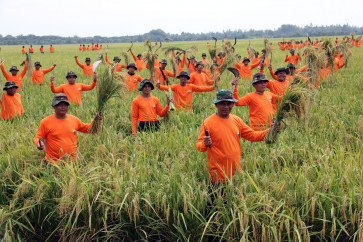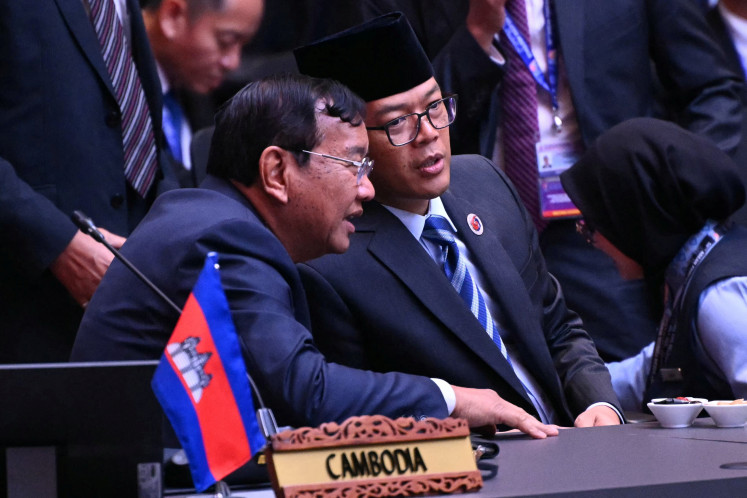Popular Reads
Top Results
Can't find what you're looking for?
View all search resultsPopular Reads
Top Results
Can't find what you're looking for?
View all search resultsView point: Kiran Bedi: policing the police, prisons, corruption
Is there such a thing as a good cop in Indonesia? Most of us Indonesians seem to doubt it
Change text size
Gift Premium Articles
to Anyone
I
s there such a thing as a good cop in Indonesia? Most of us Indonesians seem to doubt it.
If people experience a burglary, theft or other criminal case, they tend to think twice about reporting it to the police. They say they would end up getting into more trouble and losing more money.
This distrust of the police is deeply ingrained, and with good reason.
Indonesia is known to be one of the world's most corrupt countries, ranking 107 out of 175 countries, according to Transparency International's Corruption Perception Index 2014. And the police are considered one of the most corrupt institutions in the land. The fact that they are notorious for human rights abuses doesn't help to bolster their image much either.
How are the police in India? Not that different really. Ranking 85 on the TI index, India ranks better on the corruption index. But regarding the police, they're just as bad as in Indonesia.
According to a 2009 Human Rights Watch Report entitled India: Overhaul Abusive, Failing Police System, the Indian police system is not only rife with human rights violations, it even encourages them. In 2015 an updated report didn't document any changes. 'Proposed police reforms have also languished even as police continue to commit human rights violations with impunity'.
So it's truly amazing that in the bastion of masculinity that is the police force, in a notoriously patriarchal society like India, that the figure of Kiran Bedi could rise to the top and become the first female police officer, and only female head of police in India, between the years 1972-2007.
Who is Kiran Bedi?
On Aug. 26, I had the good fortune to meet her at an event, organized by the Britcham Professional Women's Group in collaboration with IndoIndians (indoindians.com). Bedi gave a talk entitled: 'If the Four 'F's' ' Fear, Failure, Forgetfulness and Lack of Faith ' are overcome, any race can be won'.
Not the most pithy title, but her talk was inspiring nevertheless. It was drawn from amazing life experiences which she had forged through by her own willpower, determination, family support, good fortune and a burning desire to serve her country.
In the invitation, it was written that she was once voted as India's most admired and trusted women. Just among women? As a leader, she strikes me as being a rarity, whether woman or man.
Hard-working, honest, courageous, quirky and leading with a true belief in equality, compassion, love and spiritual intelligence rarely found in a leader, except maybe Nelson Mandela.
Bedi has tackled virtually every intractable problem in India: prison reform, drug abuse, corruption, gender equality, poverty, health and education. She has been the recipient of numerous awards for her efforts.
After her retirement from the police force, she focused on two NGOs for the rural and urban poor ' Navjyoti India Foundation and India Vision Foundation ' providing education, training, counseling and health care. She has a popular reality-TV show, writes columns and has written numerous books which puts me, a professional writer, to shame. In all of these endeavors, she advocates social change and civic responsibility.
If in Indonesia, there is at present no independent, effective, and impartial mechanism to lodge complaints against police abuse and violations, Bedi's latest initiative, Mission Safer India, provides a channel for citizens to log their complaints ' presumably also against the police.
Between 1993 and 1995, she also had a stint as Inspector General of Prisons in Delhi's Tihar Jail and introduced reforms ' including meditation ' that are still being implemented until now.
Meditation for prison inmates? Yes, with positive results.
Hmm, maybe Jokowi should get his whole administration, the parliament, not to mention the police to meditate daily. Well, he did say he wanted to have a mental revolution. Meditation is the way to go, pak Jokowi. And no, it's not anti-Islamic!
Bedi is also known as a prominent anti-corruption figure and was at the vanguard of a nationwide movement called India Against Corruption (IAC), formed in 2011. Due to differences among the key members, the IAC split into the Aam Aadmi Party led by Arvind Kejriwal, and Jantantra Morcha led by Anna Hazare.
In Indonesia, we have the Corruption Eradication Commission (KPK), set up in 2002. In the past few years, it's been under siege. Its most notable adversary ' surprise, surprise! ' is the Indonesian police. The two famously engaged in a 'gecko versus crocodile' debacle that was an effort to paralyze the power of the KPK.
In anticipation of the term limits for the current KPK commissioners, a selection committee comprising nine women (pansel) was formed to select the leaders of the future KPK. Out of the 500 who applied, eight candidates were chosen. Only one of them was a woman, Brig. Gen. (police) Basaria Panjaitan.
Hmm, an all-female selection committee only produced one female KPK commissioner candidate? What happened to the old adage that 'What a man can do, a woman can do better'? Various studies have proven it. Kiran Bedi has embodied it.
I asked two of the pansel members why this was the case? Both told me that they would love to see women in the KPK. But when they looked at integrity, credentials, experience, vision, leadership, independence, health and background, they didn't make the cut.
When will Indonesia have a Kiran Bedi? Did the pansel make the right choices? Will the only woman candidate be bumped out? Will the new KPK team, to be installed in December, perform as effectively as commissioners did in the KPK's heydey?
Time ' not to mention entrenched patriarchal attitudes, and the politics of power ' will tell.
_________________________
The writer is the author of Julia's Jihad.










